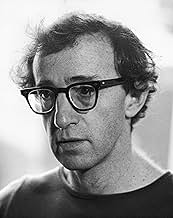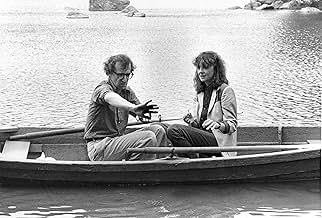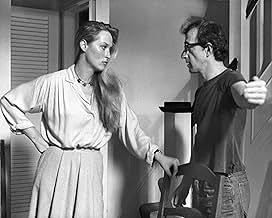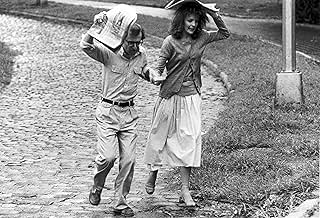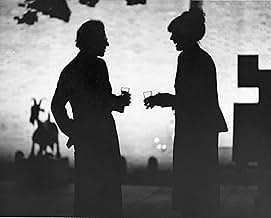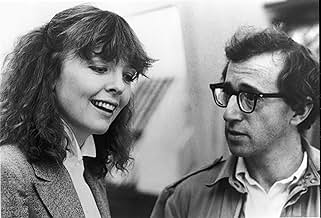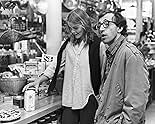Manhattan
- 1979
- Tous publics
- 1h 36min
Les angoisses et hésitations sentimentales d'un intellectuel new-yorkais.Les angoisses et hésitations sentimentales d'un intellectuel new-yorkais.Les angoisses et hésitations sentimentales d'un intellectuel new-yorkais.
- Réalisation
- Scénario
- Casting principal
- Nommé pour 2 Oscars
- 16 victoires et 24 nominations au total
Anne Byrne Hoffman
- Emily
- (as Anne Byrne)
Avis à la une
I watched Manhattan recently because i had never seen Woody Allen's films and heard this was one of his best.
I can see why people love this film, it certainly is quite original and a convincing snapshot of a group of friends in New York, but I found Woody's character just too excruciating self-possessed and irritating to enjoy the film overall.
I guess you either love him or hate him, but he reminded me of George Costanza on Seinfeld - i just wanted to shake him and say 'get over yourself!'.
As for the humor, there were a lot of attempted wit there but nothing that made me laugh out loud. I won't be a hurry to see any of his other films.
I can see why people love this film, it certainly is quite original and a convincing snapshot of a group of friends in New York, but I found Woody's character just too excruciating self-possessed and irritating to enjoy the film overall.
I guess you either love him or hate him, but he reminded me of George Costanza on Seinfeld - i just wanted to shake him and say 'get over yourself!'.
As for the humor, there were a lot of attempted wit there but nothing that made me laugh out loud. I won't be a hurry to see any of his other films.
I used to hold this film as somewhat of a sacred cow when I first saw it in 1979. I was a proscribed Woody fan and
although I still like a few of his movies, this is no longer one of them, on recent review.
I recently purchased copies of Manhattan and Annie Hall.
I watched the latter first and it charmed my socks off again. One classic scene after another signals the height of Allen's art in this hilarious masterwork. Manhattan is a different story.
Perhaps my recent viewing of Wild Man Blues has hipped
me to what an whining, pampered egomaniac Mr. Allen is.
Perhaps it's the irony of his Chaplin-like dalliances with young women that have set me against him. But I now watch Manhattan
and see a pathetic, overblown Allen literally feeding lines to his
fellow actors to give him some smarmy comeback that never fails to show how intellectually superior he is. Different from Annie Hall, Allen is no longer the underdog but an ugly, obnoxious
over-lord...
His characters in Manhattan, are cardboard. They are not real and
the situations are not real. I have no feeling for anyone in this
movie, except Woody, who I feel contempt for, given his massive
and unfunny self-indulgence. It's pathetic to see Allen set up
Hemingway with lines that a teenager would never say in a million
years, just to trump up his flaccid ego. Everyone in this movie actually feeds him lines to trump up his ego.
Like Stardust Memories, this one shows Woody at his self- indulgent worst. This movie looks wonderful and sounds wonderful with the Gershwin score, but on further review, this
one's hollow and ultimately a maddening tribute to an egomaniac.
although I still like a few of his movies, this is no longer one of them, on recent review.
I recently purchased copies of Manhattan and Annie Hall.
I watched the latter first and it charmed my socks off again. One classic scene after another signals the height of Allen's art in this hilarious masterwork. Manhattan is a different story.
Perhaps my recent viewing of Wild Man Blues has hipped
me to what an whining, pampered egomaniac Mr. Allen is.
Perhaps it's the irony of his Chaplin-like dalliances with young women that have set me against him. But I now watch Manhattan
and see a pathetic, overblown Allen literally feeding lines to his
fellow actors to give him some smarmy comeback that never fails to show how intellectually superior he is. Different from Annie Hall, Allen is no longer the underdog but an ugly, obnoxious
over-lord...
His characters in Manhattan, are cardboard. They are not real and
the situations are not real. I have no feeling for anyone in this
movie, except Woody, who I feel contempt for, given his massive
and unfunny self-indulgence. It's pathetic to see Allen set up
Hemingway with lines that a teenager would never say in a million
years, just to trump up his flaccid ego. Everyone in this movie actually feeds him lines to trump up his ego.
Like Stardust Memories, this one shows Woody at his self- indulgent worst. This movie looks wonderful and sounds wonderful with the Gershwin score, but on further review, this
one's hollow and ultimately a maddening tribute to an egomaniac.
Woody Allen once said that, whereas Scorsese had generated a host of imitators, he had generated none. This may be true; films like Manhattan certainly come along far too infrequently.
That this is such a gorgeous film may strike those following the formulaic, Hollywood approach to cinema as strange and heretical. The story is unexciting (restless male in love triangle), most of the characters are unsympathetic, at least on the surface (particularly Isaac), Allen leaves lose ends lying around all over the place, and there's certainly no action (unless you count the car-chase-without-a-chase-scene involving Diane Keaton, Woody Allen and a VW Beetle).
So why should any self-respecting member of the MTV generation spend time on this film? Well, here are a few reasons.
The script is wit of the highest order. This is not gag-a-minute humour like Friends, but an altogether more acute art form stemming from character, some wonderful dialogue and a fair amount of darkness (I love the bit about Isaac trying to run over his ex-wife's lover). Allen is also prepared to turn his biting satire to personal issues, such as being Jewish. Just don't expect someone to look shrug their shoulders, slap their forehead and with mid-rising intonation say d'uh! It's not that kind of comedy.
Then there is the gorgeous cinematography. Woody loves Manhattan and you can certainly tell. If there is one criticism of the film, it is that it leaves a rather picture postcard impression of the city, but I suppose if it's love, then it's love. Much of the film appears to have been shot at either sunrise or sunset to soften the light, and there are spectacular views of the towers, bridges and waterways of America's finest metropolis.
Then, I suppose, there is the fact that Manhattan is probably the archetypal Woody Allen film. Other films may be better, like Annie Hall or Hannah and Her Sisters but, in Manhattan, all the elements of Allen's style are in perfect balance. There's the jazz, the neurotic, unsympathetic lead, the choice between stable and highly-strung women, the self-mocking humour (hilariously done in the opening voice-over), the railing against intellectual snobbery, the deep unease with popular culture.
And there are great performances. Allen is at his most difficult and in some ways his least likable. As Isaac, he's trying to do the right thing, but is rarely selfless enough to follow through with it. Diane Keaton is great as Mary, the lynchpin between the two love triangles vain, pretentious and yet you can see why Isaac falls for her. Well, all the actors are great, and very believable, but special mention must go to Meryl Streep, who manages to steal the show with her tiny cameo as Isaac's ex-wife, writing a book about their break-up and living with their son and her lover. She is magnificent.
Of course, the film will also do nothing to dispel the popular rumour that New Yorkers are neurotic, self-obsessed and self-indulgent at least that narrow social circle Allen so often writes about. If you don't mind that, though (and I'm English, so what do I care) you're in for a treat. As with the city itself, the memories of this film will stay with you forever.
That this is such a gorgeous film may strike those following the formulaic, Hollywood approach to cinema as strange and heretical. The story is unexciting (restless male in love triangle), most of the characters are unsympathetic, at least on the surface (particularly Isaac), Allen leaves lose ends lying around all over the place, and there's certainly no action (unless you count the car-chase-without-a-chase-scene involving Diane Keaton, Woody Allen and a VW Beetle).
So why should any self-respecting member of the MTV generation spend time on this film? Well, here are a few reasons.
The script is wit of the highest order. This is not gag-a-minute humour like Friends, but an altogether more acute art form stemming from character, some wonderful dialogue and a fair amount of darkness (I love the bit about Isaac trying to run over his ex-wife's lover). Allen is also prepared to turn his biting satire to personal issues, such as being Jewish. Just don't expect someone to look shrug their shoulders, slap their forehead and with mid-rising intonation say d'uh! It's not that kind of comedy.
Then there is the gorgeous cinematography. Woody loves Manhattan and you can certainly tell. If there is one criticism of the film, it is that it leaves a rather picture postcard impression of the city, but I suppose if it's love, then it's love. Much of the film appears to have been shot at either sunrise or sunset to soften the light, and there are spectacular views of the towers, bridges and waterways of America's finest metropolis.
Then, I suppose, there is the fact that Manhattan is probably the archetypal Woody Allen film. Other films may be better, like Annie Hall or Hannah and Her Sisters but, in Manhattan, all the elements of Allen's style are in perfect balance. There's the jazz, the neurotic, unsympathetic lead, the choice between stable and highly-strung women, the self-mocking humour (hilariously done in the opening voice-over), the railing against intellectual snobbery, the deep unease with popular culture.
And there are great performances. Allen is at his most difficult and in some ways his least likable. As Isaac, he's trying to do the right thing, but is rarely selfless enough to follow through with it. Diane Keaton is great as Mary, the lynchpin between the two love triangles vain, pretentious and yet you can see why Isaac falls for her. Well, all the actors are great, and very believable, but special mention must go to Meryl Streep, who manages to steal the show with her tiny cameo as Isaac's ex-wife, writing a book about their break-up and living with their son and her lover. She is magnificent.
Of course, the film will also do nothing to dispel the popular rumour that New Yorkers are neurotic, self-obsessed and self-indulgent at least that narrow social circle Allen so often writes about. If you don't mind that, though (and I'm English, so what do I care) you're in for a treat. As with the city itself, the memories of this film will stay with you forever.
After the phenomenal success of 'Annie Hall,' the hilarious Oscar-winning comedy detailing the romantic exploits of neurotic Jewish comedian Alvey Singer, Woody Allen had become of America's most respected filmmakers. In 1979, he released what is generally accepted as his second great masterpiece, 'Manhattan,' a poignant tribute to the city that Allen loves so dearly. Written by Allen and his 'Annie Hall'-collaborator Marshall Brickman, 'Manhattan' stars Allen as Isaac Davis, a twice-divorced, 42-year-old comedy writer who is intimately involved with a 17-year-old high school student, Tracy (an Oscar-nominated Mariel Hemingway). Meanwhile, Isaac begins to fall for Mary (Diane Keaton), who is the secret mistress of his best friend (Michael Murphy). Adding to all of Isaac's troubles, his former second wife, Jill (Meryl Streep), who had originally left him for another woman, has plans to write a tell-all book on their failed marriage.
If this all seems very confusing to you, then you're not alone. Just as in 'Annie Hall,' Allen plays the hopeless romantic who is struggling desperately to understand the maddening complexity of human relationships. Though Tracy is only seventeen years old, she is arguably the most honest and mature of the women in Isaac's life; nonetheless, he doesn't treat her seriously. In his mind, anything that she says is quite obviously influenced by the naivety and downright ignorance of the young. Their relationship was never meant to be anything more than a brief "fling," and so he feels no guilt for seeing another woman behind his back, an act that makes him livid when it ultimately happens to him.
'Manhattan' was shot in beautiful crisp black-and-white by Gordon Willis, who has also worked on, among countless other films, 'Annie Hall' and the three installments of 'The Godfather.' The cinematography offers New York City a romantic 1940s feel, reminiscent of how Allen claims to remember the city as a child: "Maybe it's a reminiscence from old photographs, films, books and all that. But that's how I remember New York. I always heard Gershwin music with it, too. In 'Manhattan' I really think that we that's me and cinematographer Gordon Willis succeeded in showing the city. When you see it there on that big screen it's really decadent."
Mysteriously, this film remains the least-liked by the director himself, though, at the same time, it was also his most commercially successful. As you've no doubt already noticed from this review, 'Manhattan' is often likened to 1977's 'Annie Hall,' perhaps due to the repeated casting of Allen and Keaton (a not uncommon occurrence) or its similar attempt to uncover the elusive secrets behind love and relationships. In terms of film-making style, however, the films are quite dissimilar. Unlike the highly-energetic 'Annie Hall' which cut back and forward in time, visited old memories, broke the fourth wall and made conversations with passing extras 'Manhattan' boasts a more classical approach quiet, softly-spoken and accompanied by a wistfully slow jazzy soundtrack, also relying heavily on the works of George Gershwin.
If this all seems very confusing to you, then you're not alone. Just as in 'Annie Hall,' Allen plays the hopeless romantic who is struggling desperately to understand the maddening complexity of human relationships. Though Tracy is only seventeen years old, she is arguably the most honest and mature of the women in Isaac's life; nonetheless, he doesn't treat her seriously. In his mind, anything that she says is quite obviously influenced by the naivety and downright ignorance of the young. Their relationship was never meant to be anything more than a brief "fling," and so he feels no guilt for seeing another woman behind his back, an act that makes him livid when it ultimately happens to him.
'Manhattan' was shot in beautiful crisp black-and-white by Gordon Willis, who has also worked on, among countless other films, 'Annie Hall' and the three installments of 'The Godfather.' The cinematography offers New York City a romantic 1940s feel, reminiscent of how Allen claims to remember the city as a child: "Maybe it's a reminiscence from old photographs, films, books and all that. But that's how I remember New York. I always heard Gershwin music with it, too. In 'Manhattan' I really think that we that's me and cinematographer Gordon Willis succeeded in showing the city. When you see it there on that big screen it's really decadent."
Mysteriously, this film remains the least-liked by the director himself, though, at the same time, it was also his most commercially successful. As you've no doubt already noticed from this review, 'Manhattan' is often likened to 1977's 'Annie Hall,' perhaps due to the repeated casting of Allen and Keaton (a not uncommon occurrence) or its similar attempt to uncover the elusive secrets behind love and relationships. In terms of film-making style, however, the films are quite dissimilar. Unlike the highly-energetic 'Annie Hall' which cut back and forward in time, visited old memories, broke the fourth wall and made conversations with passing extras 'Manhattan' boasts a more classical approach quiet, softly-spoken and accompanied by a wistfully slow jazzy soundtrack, also relying heavily on the works of George Gershwin.
Woody Allen started off making outrageous, cheap, hit-and-miss, unpretentious comedies, the best of which were probably "Love and Death" and "Sleeper." The comedy became more rooted in reality and grafted onto an engaging story of lost love in "Annie Hall," which I think is still his best film. After that, "Interiors." Ka-Boom. Since then there have been no more absurd comedies, several gloomy dramas, and many more or less successful attempts to blend comedy with serious themes.
This is one of the dark comedies and didn't work for me. Allen is going with a high-school girl, falls for a woman nearer his own age, alienates his close friend, and finally decides -- too late -- that the younger girl is his soul mate. It ends ambiguously with her leaving for Europe. The plot is out of a soap opera. It does have some witty lines (almost all of them given to Allen himself) and a lot of inside New Yorker intellectual allusions, but, aside from the Gershwin score, isn't worth seeing twice. Really, it's pretty boring. The performances aren't bad, but Allen doesn't challenge himself either. It's his old neurotic, stuttering, put-upon persona that is by now more than familiar enough. There's just nothing new.
It isn't that Allen had run out of ideas by 1979 because he's made some successful films since then -- "Hollywood Ending" and "Broadway Danny Rose", for instance. But "Manhattan" is one of the many that simply got by me. It didn't seem charming. It seemed repetitious and pointless. I didn't bother counting the times someone meets another and says, "Hiii," using the contours of the fourth tone in Mandarin Chinese. And no one seems to say it just once during a given encounter, but several times. "Hii, hii -- how AHH you?"
I kept waiting for one of two things to happen. Either IT takes off or I get drawn in. But neither contingency was realized. I cared about the entanglements in "Annie Hall," but here it didn't matter to me who wound up with whom, and I never got the feeling that it mattered much to Allen either.
This is one of the dark comedies and didn't work for me. Allen is going with a high-school girl, falls for a woman nearer his own age, alienates his close friend, and finally decides -- too late -- that the younger girl is his soul mate. It ends ambiguously with her leaving for Europe. The plot is out of a soap opera. It does have some witty lines (almost all of them given to Allen himself) and a lot of inside New Yorker intellectual allusions, but, aside from the Gershwin score, isn't worth seeing twice. Really, it's pretty boring. The performances aren't bad, but Allen doesn't challenge himself either. It's his old neurotic, stuttering, put-upon persona that is by now more than familiar enough. There's just nothing new.
It isn't that Allen had run out of ideas by 1979 because he's made some successful films since then -- "Hollywood Ending" and "Broadway Danny Rose", for instance. But "Manhattan" is one of the many that simply got by me. It didn't seem charming. It seemed repetitious and pointless. I didn't bother counting the times someone meets another and says, "Hiii," using the contours of the fourth tone in Mandarin Chinese. And no one seems to say it just once during a given encounter, but several times. "Hii, hii -- how AHH you?"
I kept waiting for one of two things to happen. Either IT takes off or I get drawn in. But neither contingency was realized. I cared about the entanglements in "Annie Hall," but here it didn't matter to me who wound up with whom, and I never got the feeling that it mattered much to Allen either.
Le saviez-vous
- AnecdotesMeryl Streep shot her scenes during breaks in filming Kramer contre Kramer (1979).
- GaffesIn the first scene at Elaine's, as Isaac is beginning to say something, two people (presumably customers of the restaurant, as it was running while they were shooting) walk in front of the camera. Isaac laughs, and quickly recovers with an impromptu remark about how his girlfriend has to go and do homework.
- Citations
Isaac Davis: All the times I come over here, I can't understand how you can prefer her to me.
Jill: You can't understand that?
Isaac Davis: No. It's a mystery to me.
Jill: Well, you knew my history when you married me.
Isaac Davis: I know. My analyst warned me, but you were so beautiful that I got another analyst.
- Crédits fousOne of the very few Woody Allen films to not have traditional opening credits, save the production company bumper (United Artists), and the film title MANHATTAN is seen as a long vertical flashing bright neon sign, located on the side of a New York City building, and is seen for under seven seconds just before Woody Allen narrates his first line.
- ConnexionsEdited into Intimate Portrait: Diane Keaton (2001)
- Bandes originalesRhapsody in Blue
(1924)
Music by George Gershwin
Performed by The New York Philharmonic
Conducted by Zubin Mehta
Piano soloist: Paul Jacobs
Music director: Zubin Mehta
Meilleurs choix
Connectez-vous pour évaluer et suivre la liste de favoris afin de recevoir des recommandations personnalisées
Détails
Box-office
- Budget
- 9 000 000 $US (estimé)
- Montant brut aux États-Unis et au Canada
- 39 946 780 $US
- Week-end de sortie aux États-Unis et au Canada
- 485 734 $US
- 29 avr. 1979
- Montant brut mondial
- 40 194 067 $US
- Durée1 heure 36 minutes
- Couleur
- Mixage
- Rapport de forme
- 2.39 : 1
Contribuer à cette page
Suggérer une modification ou ajouter du contenu manquant



